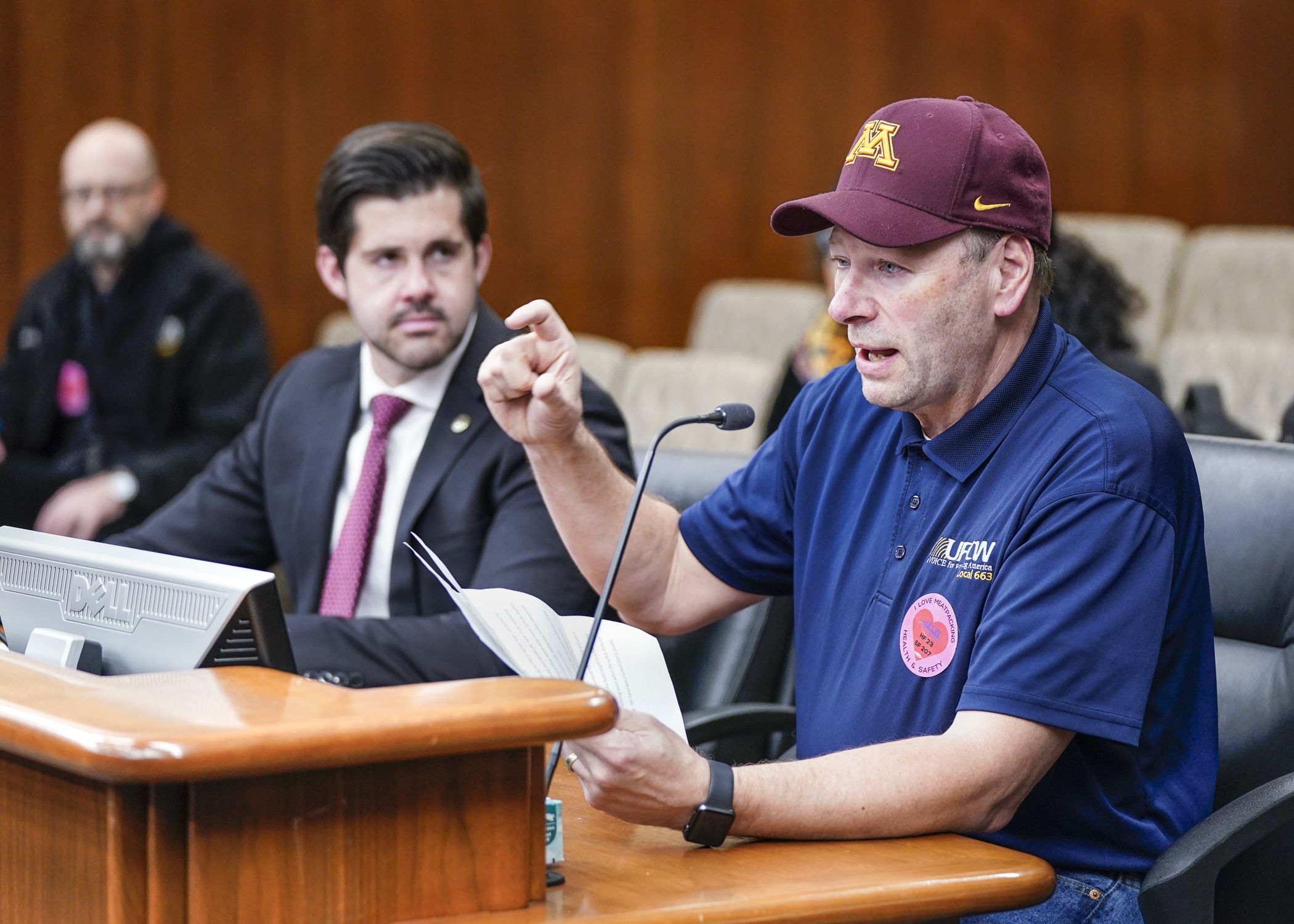‘We have the right to work in a safe environment,’ meatpacking workers tell lawmakers

Lacerations and torn rotator cuffs. Tendinitis and crushed fingers. Broken bones and permanent disabilities. Numerous deaths during the COVID-19 pandemic. These are some of the woes that have befallen workers at Minnesota’s meat and poultry processing plants.
It is a grim list — and the motivation behind a decision by Rep. Dan Wolgamott (DFL-St. Cloud) to sponsor HF23.
“During the COVID-19 outbreak, I heard heartbreaking and horrifying stories from my constituents who were working in inhumane conditions at a local meat processing plant,” said Wolgamott. “The intention of this legislation is to provide comprehensive workplace health and safety protections, and to ensure that workers have access to the benefits and training needed to work safely during pandemic times and during all times.”
The House Labor and Industry Finance and Policy Committee approved the bill, as amended, 11-2 Tuesday. It heads next to the House Agriculture Finance and Policy Committee.
Dubbed the Safe Workplaces for Meat and Poultry Processing Workers Act, Wolgamott’s bill aims to improve working conditions by:
- establishing a meatpacking industry worker rights coordinator within the Department of Labor and Industry to organize enhanced regulatory oversight at plants throughout the state;
- affirming a right to refuse to work under dangerous conditions as defined under current state statute;
- prohibiting employer retaliation against employee whistleblowers;
- instituting safe worker program training requirements for employers to address the prevalence of chronic injuries and severe accidents across the industry; and
- specifying protections workers are entitled to during a future peacetime public health emergency.
These regulations would apply to meatpacking operations and meat-processing employers with 50 or more employees. A local butcher shop or supermarket deli where meat is sold direct to customers would not be affected.
The funding request is $529,000 for the upcoming biennium.
Numerous members of UFCW Local 633 urged support, with many sharing their first-hand experiences from years working at plants in Austin and Worthington.
“We have the right to work in a safe environment and this legislation creates industry standards within the meatpacking industry that are long overdue,” said Claudia Ambriz. “We always want workers to go home to their families the same way they come to work – alive and safe.”
“The global COVID-19 pandemic pulled back the curtain on this industry,” said Rena Wong, the local’s president. She believes the bill is necessary to better regulate plants and adequately protect workers from persistent workplace dangers.
Tamara Nelsen, executive director of the Minnesota AgriGrowth Council, supports many elements of the bill but also voiced several employer concerns. Primarily, she criticized the bill’s definition of a meat-processing employee as overly broad and questioned the need for a dedicated worker rights coordinator.
Greg Endres, the owner of a small meat-processing shop in Dakota County, fears the effect this bill would have on mom-and-pop operators in the industry. He would like to see the 50-or-more employee threshold raised even higher, and believes many of the bill’s mandates would be unfeasible for all except the few behemoths in the industry, potentially putting many small processors out of business.
The bill received a split reception from Republicans.
Rep. Shane Mekeland (R-Clear Lake) staked out a strongly critical position during member discussion. He insists the bill is redundant, as there are many laws on the books right now that ought to be protecting workers in this industry. In his view, state regulators are simply not doing their job in enforcing those laws.
In contrast, Rep. Joe McDonald (R-Delano) commended Wolgamott for accepting feedback from across the aisle and in creating a workplace size threshold.
“His bill will not hurt small mom-and-pop businesses,” McDonald said.
Related Articles
Search Session Daily
Advanced Search OptionsPriority Dailies
Speaker Emerita Melissa Hortman, husband killed in attack
By HPIS Staff House Speaker Emerita Melissa Hortman (DFL-Brooklyn Park) and her husband, Mark, were fatally shot in their home early Saturday morning.
Gov. Tim Walz announced the news dur...
House Speaker Emerita Melissa Hortman (DFL-Brooklyn Park) and her husband, Mark, were fatally shot in their home early Saturday morning.
Gov. Tim Walz announced the news dur...
Lawmakers deliver budget bills to governor's desk in one-day special session
By Mike Cook About that talk of needing all 21 hours left in a legislative day to complete a special session?
House members were more than up to the challenge Monday. Beginning at 10 a.m...
About that talk of needing all 21 hours left in a legislative day to complete a special session?
House members were more than up to the challenge Monday. Beginning at 10 a.m...